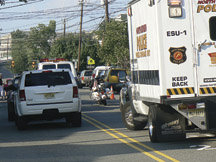When over 75 minors were brought into North Bergen police headquarters in only two weeks, heads began to turn.
In response to a surge in juvenile crime, the police have begun stepping up curfew enforcement. Adopted in July 1996, the curfew law requires that anyone under the age of 18 must be home by 10 p.m. Monday through Thursday and by 11 p.m. Friday and Saturday.
For the first offense, minors are brought down to headquarters and held until a parent or guardian can come in and sign a notification for their release. Subsequent offenses result in a court summons and fines of no more than $1,000, or up to 90 days of community service, according to Lt. Patrick Irwin.
“I’m a 41-year-old man who carries a gun, but I don’t walk alone at night.” – Police Capt. Robert Dowd
____________
“It seems like we have more of a string of juvenile crimes,” said Irwin, “[crimes] like burglary of vehicles, street fights, and stuff like that going on after hours.”
Other typical juvenile crimes include arson, criminal mischief, and graffiti, police say.
On Friday, July 15 and Saturday, July 16, police arrested 45 minors in violation of the curfew law. The following weekend, 32 were arrested.
The town of West New York is also adapting to the increase in juvenile crimes. A vote will take place on Aug. 17 that could move the curfew times up an hour. The new times would be changed from 11 p.m. to 10 p.m. Sunday through Thursday and from 12 a.m. to 11 p.m. Friday and Saturday, which would match North Bergen.
The town of Bayonne is considering implementing a curfew in response to the recent savage beating of a resident by a group of teens.
North Bergen police plan to continue to step up curfew enforcement on Fridays and Saturdays through the summer.
Giving police an edge
The big policing advantage to a curfew law is that police have legal grounds to arrest youths suspected of committing other crimes. If police suspect but cannot prove that a youth is going to commit a harsher crime, the curfew law gives officers something to charge them with.
However, because police have to guess the accurate age of teenagers from first glance, those just above curfew age are more likely to be stopped or searched. Opponents of the curfew law argue that this is a violation of their civil rights.
Is it necessary?
“North Bergen has a curfew ordinance for minors in order to protect unsupervised children from danger and ensure that our neighborhoods are safe and secure at all times,” said Mayor Nicholas Sacco. “Our police officers use their discretion in how best to enforce the ordinance and I believe they have done an outstanding job making sure residents can continue to enjoy excellent quality of life here in the township.”
A 2006 study conducted by Patrick Kline of the University of California Berkeley and the National Bureau of Economic Research found that curfews appear to have important effects on the criminal behavior of youth.
“Being subject to a curfew reduces the number of violent and property crimes committed by juveniles below the curfew age by approximately 10 percent in the year after enactment,” the study says, “with the effects intensifying substantially in subsequent years for violent crimes.”
The study concludes that, “In cities where a large fraction of youth crime occurs at night and the cost of additional nighttime policing is low, curfews may be an effective law enforcement tool.”
However, according to Kline’s analysis, curfews have no effect on youths above the curfew age, which in North Bergen would be anyone over 17.
“I think they work to a degree,” said North Bergen Police Captain Robert Dowd. “Maybe the parents are working, maybe they’re out.”
Dowd said a benefit of the curfew is that it can protect minors from becoming victims as well.
According to Dowd, minors aren’t the only ones who shouldn’t be in the streets unattended.
“I’m a 41-year-old man who carries a gun, but I don’t walk alone at night,” said Dowd. He said his sentiment wasn’t specific to North Bergen, but other urbanized towns in the area as well. “Our [crime rate] numbers in the last 10 years are down dramatically,” he said.
Stephen LaMarca may be reached at slamarca@hudsonreporter.com.
